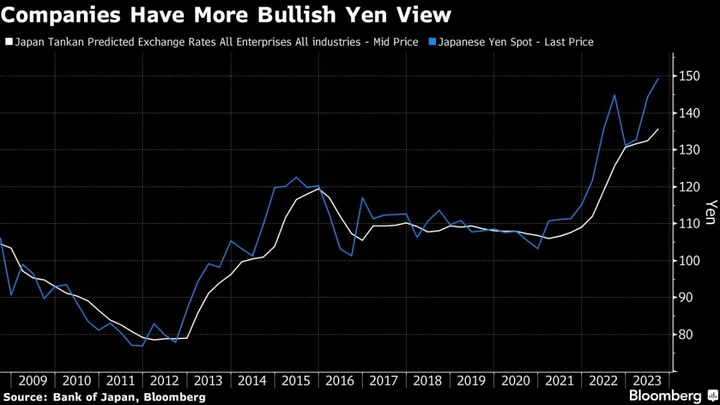Japanese exporters are making bullish assumptions about the outlook for the yen, allowing themselves to more easily beat earnings expectations and keep the nation’s equities benchmarks among the world’s best performers.
Companies on the Topix 500 Index that released guidance for the fiscal year ending in March 2024 as a whole based their view on the yen averaging 140.22 per dollar during the period, according to data compiled by Bloomberg. That’s 5% above the current market rate, higher than the average since the start of the fiscal year and stronger than the median forecast of foreign exchange strategists.
The key point for exporters is that a weaker-than-assumed Japanese currency should translate into higher-than-forecast profits when overseas earnings are brought home and converted into yen. Toyota Motor Corp. is up more than 6% already this month after announcing that foreign exchange gains boosted first-half operating income, and Nintendo Co. has advanced about 10% after beating expectations with help from the weak currency.
The Bank of Japan’s latest Tankan survey also shows large manufacturers are using yen assumptions that are stronger than the spot rate. The next report is set to be released mid-December.
Japan’s Topix and Nikkei 225 stock gauges have touched three decade highs this year, supported by soaring profits at exporters as the yen slid to the weakest level since 1990.
Given the continuing uncertainty for the global economy, it makes sense to use yen assumptions to keep earnings guidance conservative for now and revise it upward again later, according to Takatoshi Itoshima, a strategist at Pictet Asset Management Japan Ltd. in Tokyo.
Masahiro Ichikawa, the chief market strategist at Sumitomo Mitsui DS Asset Management, echoed this view. “The results for the current fiscal year have been revised upward to increase revenues and profits, and the outlook performance this fiscal year has been quite good,” he said.
To be sure, equities analysts aren’t taking company earnings guidance at face value. They expect Toyota’s full-year net income will be ¥261 billion ($1.8 billion) higher than the carmaker’s own projection. There are similarly wide disparities with Takeda Pharmaceutical Co., Honda Motor Co. and ANA Holdings Inc.
Toyota has said it gained an extra ¥45 billion in operating profit for every 1 yen of additional weakness against the dollar. Ten of Japan’s biggest companies are likely to pocket an extra ¥1.4 trillion in profits this fiscal year if the yen remains around 150 per dollar, a Bloomberg calculation shows.
Yet there is also a chance that corporate assumptions about the yen turn out to be closer to reality than the forecasts of currency strategists, who see it trading near 148 per dollar during the rest of this quarter before heading toward 145 by the end of March, according to figures compiled by Bloomberg.
Foreign exchange specialists have struggled to keep pace with the yen’s sharp gains and losses over the past two years. At the beginning of January, when it traded around 130 versus the dollar, they projected it would end this year around the same level. Instead it slumped, depreciating past 150.
“I think that the possibility of a strong yen must be taken into consideration to some extent,” said Atsuko Ishitoya, strategist at Daiwa Securities Co. “I think that these figures are conservative and are at the right level for the right reasons.”
--With assistance from Natsuki Nishiwaki and Nobuhiro Sato.

